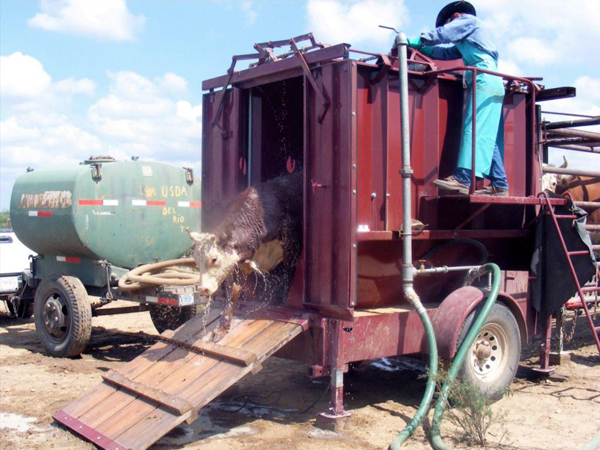- South Texas Students Meet Accordion Music Icons Los Tigres Del Norte In Edinburg Thanks To Khs America/Hohner Alianza Académica Initiative
- Fragile Planet Offers a Nighttime Wildlife Experience
- Falcons Soccer Off & Running
- Cameron County Receives Funds to Improve Two Parks
- Falcons Complete First Half of 32-6A
- School District to Help out Victims of California Wildfires
- Sand Castle Days Continued Despite Unexpected Weather
- Ready for District
- Discussion of Garbage Dumpster Rates, Agreements Between State & City on Highway Regulations, and More
- 31st Annual Shrimp Cook-Off is Right Around the Corner
Ranchers Hindered in Efforts to Combat Cattle Fever Ticks
- Updated: August 10, 2018

A Cattle Fever Tick spray box in action in South Texas. Photo: ©Texas Animal Health Commission
Texas Farm Bureau asks state agency to reconsider its actions
(WACO, Texas)—Texas Farm Bureau (TFB) is disappointed in actions taken this week by the Texas Department of Agriculture that stopped the use of cattle spray boxes for the treatment of cattle fever ticks in South Texas.
The state’s largest general farm organization supports the efforts of the Texas Animal Health Commission (TAHC) and the United States Department of Agriculture (USDA) Animal and Plant Health Inspection Service (APHIS) in their role to combat invasive cattle fever ticks.
“Removal of this tool has jeopardized the health of the Texas cattle herd and the viability of farmers and ranchers,” TFB President Russell Boening, a farmer and rancher from Poth, said. “The cattle fever tick, and the disease it carries, has the capability to cripple the Texas cattle industry if it is not contained.”
TFB asks the Texas Department of Agriculture to reconsider its actions. Experts in fever tick eradication and animal well-being should be allowed to use all tools approved in the fight to control cattle fever ticks.
Boening noted consumers can be assured that farmers, ranchers and regulatory officials have the utmost consideration for animal health and well-being during and after treatment.
“The safety and wholesomeness of beef is not blemished by the use of this product,” he said.
Spray box operators are trained under the supervision of state and federal veterinary officials. The spray solution is sampled and tested for accurate and consistent active ingredient concentrations before treatment. This ensures correct application of the federally-approved insecticide.
“The mobile spray boxes have been approved for use by the Environmental Protection Agency for decades and offer real advantages over stationary dipping vats,” Boening said.
The spray boxes are an important tool in the eradication effort and are not known by TAHC or USDA officials to cause cattle death, he said.
The ticks are capable of carrying and transferring a disease commonly known as cattle fever, which can kill up to 90 percent of those infected.
